Before discussing the term What is Digital Marketing and Future of Digital Marketing in India, I request you to just recall your childhood days, what was your reaction when you saw your favourite billboards or hoarding? because I clearly remember, even today.
As a kid in India, my experiences from the back seat of our car with my parents were mostly varied between: “Mom, when are we there?” and “wow, look, it’s McDonald’s, can we go?” until we came across one of those 15 ft, a tempting banner appeared along the roadside.
As a kid growing up with Indian parents, we all know the answer to both of those questions was almost always the same: “no, not yet”. Big brands usually often conduct a billboard war, such as this one between Audi and BMW, which received a lot of laughs and attention:

Today, billboard or hoarding advertising, unfortunately, or fortunately is almost dead.
Just give it a thought: Companies like Google and Facebook make more money than any other traditional media company, it is because they have more eyes. That’s why digital marketing is so significant; because it is where the eyes are focused nowadays.
The main factor for the downfall of banners and billboards is that because the future of driving will look like this:

Even though self-driving cars are already available in the market, drivers still remain alert, but as technology evolves, not even a single passenger will bother looking at the road.
An analysis of the market behaviour, product range, and organization’s mission is an integral part of the traditional marketing cycle. Digital marketing is a relatively young strategy but has developed strong roots in business culture and lifestyle.
Businesses always wanted to experiment with new marketing methods but as digital technology exploded, such as wide-range and easily accessible use of computers and mobiles. As a result, the term “digital marketing” was framed.
Now, the question will come to our mind, “What is Digital Marketing, What is the difference between traditional marketing vs digital marketing, what are its components, how it works and why is it important? Let us discuss all this now in-depth:
What Is Digital Marketing?
Traditional Marketing vs Digital Marketing
Why Digital Marketing is Important
How Digital Marketing Works
Types of Digital Marketing
Digital Marketing for Startups
Importance of Digital Marketing for the Success of a Business
Why Choose Digital Marketing as a Career
Future of Digital Marketing in India
Conclusion
What is Digital Marketing?
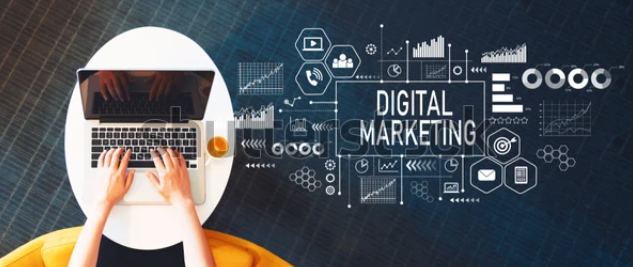
Branding your firm online, whether you call it digital marketing, online marketing, or internet advertising, is indeed an in-demand thing these days. After all, online activity has almost doubled itself since the last decade, making a significant change in how people buy things and connect with brands.
What is digital marketing, exactly? Like any other sort of marketing, digital marketing is a strategy to engage and influence your target audience. The key difference is that you interact and influence your buyers ONLINE.
Digital marketing, in its most basic form, refers to any online marketing campaign through digital means and modes. The basic form of digital marketing includes; SEO, Email Marketing, Pay-Per-Click Advertising, Social Media Marketing, and even Blogging are all types of digital marketing that help consumers to discover about your business and thus buy products or services from you.
Here are among the most basic digital marketing assets, which are being used by firms to reach out to customers online. A digital marketing asset could be almost anything. It surely needs to be an online marketing tool. However, many clients are unaware of the assets of digital marketing resources available to them. Here are a couple of examples:
- Your Firm’s website
- Branded merchandising (logos, icons, etc)
- Video content (video ads, product demos, etc)
- Images (infographics, product images, company photos, etc)
- Written content
- Testimonials
- Social media pages
As you can see, this list only touches the surface. I mean, the majority of digital marketing assets will fit into one of these categories, but an intelligent marketer will continue to come up with new ways to contact clients online, so the list will continue to increase.
Traditional Marketing vs Digital Marketing
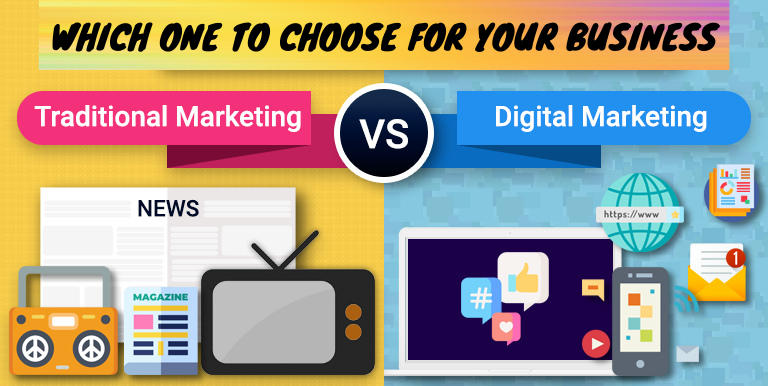
What’s the difference between traditional marketing vs digital marketing, and which should you go with? How to choose the right marketing form is an age-old concern on every marketer’s mind. Now, this is where you’ll find all that you need to understand.
There are numerous ways for businesses to catch the attention of their audiences, ranging from tried and true traditional marketing strategies to new and innovative digital marketing strategies.
But which method is the most effective? Which one should companies concentrate on?
There are a few points to consider when comparing traditional marketing vs digital marketing. In this post, we’ll go over the following points to offer you a better grasp of the difference between digital marketing and traditional marketing.
Now coming to our point of discussion, Which is better: digital marketing or traditional marketing? Traditional marketing is recognised for its local reach, whereas digital marketing is known for its global reach, i.e. the ads that have been posted on the internet may be viewed by people from all walks of life, and that is the power of digital marketing.
Why Digital Marketing is Important
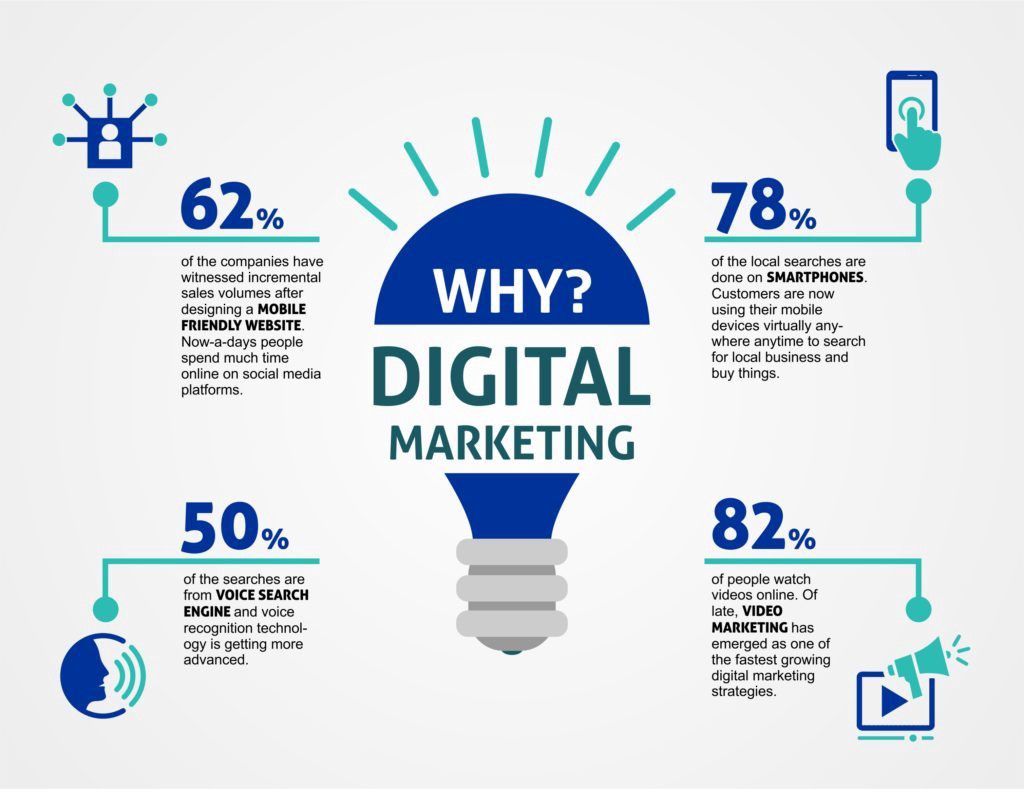
You can reach a wider audience with digital marketing than you could with traditional modes, and you can even target the buyers who really like to buy your services or products. It is really less expensive than traditional marketing, and it allows you to track results on a daily basis and adjust as needed. There are a few major benefits to digital marketing, for companies today. Let’s dive into and check Why Digital Marketing is Important, in brief:
- Variety of internet marketing strategies
- Budget-friendly marketing solutions
- An equal level of playing field
- Highly targetable and customization options
- Pinpoint campaign tracking
- Regular campaign performance feedback
Drawing a line between marketing and sales is critical – according to Aberdeen Group, organisations with good sales and marketing coordination grow at a 20% annual pace, while companies with weak coordination have seen a 4% revenue drop. If you can use digital technology to better your customers’ experience through their buying cycle, it will certainly benefit your business in many ways.
How Digital Marketing Works
Digital marketers are responsible for building brand awareness & generating leads through all company’s digital platforms, whether free or paid. Social media page, the firm’s own website, search engine rankings, email, display ads, and the company’s blog are all examples of these platforms.
How Digital Marketing Works and to evaluate the company’s performance across all channels, the digital marketer normally focuses on a particular key performance indicator (KPI) for each segment. A digital marketer who is in charge of SEO, for example, measures “organic traffic,” or traffic that comes via users who accessed a page of a company’s website through a Google search directly.
Today, digital marketing is used in a variety of marketing functions. In small businesses, one generalist may be in charge of several, above-mentioned digital marketing strategies at the same time. But, the approaches used by bigger companies are that they prefer specialists who focuses on one or two brand’s digital platform and deliver the required result.
SEO Manager
Focused KPIs: Organic traffic
In a nutshell, SEO managers help businesses rank higher on Google. This person may work directly with content creators to ensure that the content they produce performs well on Google, even if the company also shares this content on social media, by using a range of search engine optimization techniques.
Content Marketing Specialist
Focused KPIs: Time spent on a page, monitoring blog traffic and increase YouTube channel subscribers
Digital content creators are content marketing gurus. They keep records of the company’s blogging calendar on a regular basis and design a content strategy that includes video, infographics or podcasts. These experts generally work together as a team from other departments to ensure that the products and campaigns that the company offers are matched with promotional content across all digital platforms.
Social Media Manager
Focused KPIs: To check follows/ impressions and shares
The title of a social media manager is self-evident, but which social networks they handle for the company is determined by the sector. Above all, social media managers develop a content plan for written and visual content produced by a company. This person may also collaborate with the content marketing specialist to build a strategy for which kind of content to share on which social media platforms.
(Note: “impressions” means the number of times a business’s postings appear in a user’s newsfeed, as described in the KPIs above.)
Types of Digital Marketing
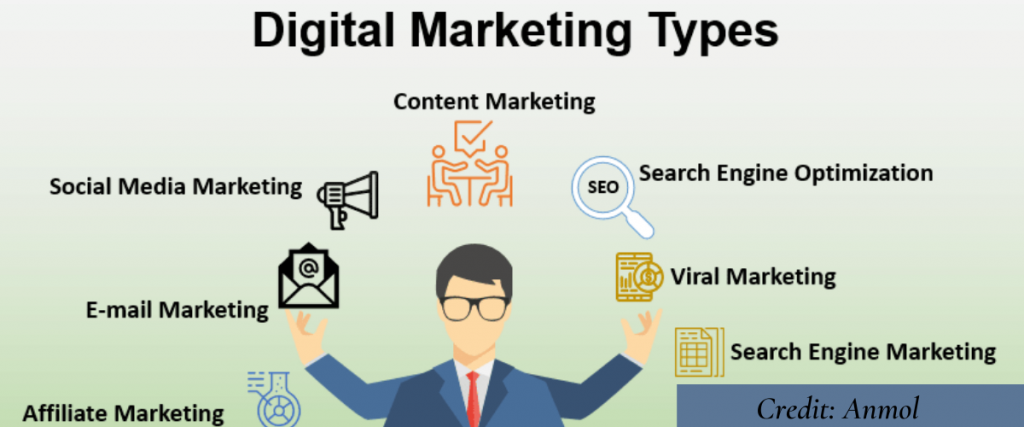
If you want to promote your business, you need to invest in digital marketing. As the Internet grows and technology advances, investing in digital marketing to reach customers is more crucial than ever. As you learn more, you’ll find that there are various components of digital marketing, and there are a variety of tactics to choose from.
So, which type of digital marketing plan is better for your business?
Here’s an overview of some of the most typical form of digital marketing methods, as well as the channels that each one uses.
1. Search Engine Optimization (SEO)
It is the method of boosting the quantity of organic (or free) traffic to your website by improving it to “rank” higher in search engine results pages. Websites, blogs, and infographics are some of the mediums that shows results from SEO practices.
There are many techniques in SEO that are used to generate qualified leads to your website. Some of them are:
On-page SEO: When looking at a website, this style of SEO relies on all the content that is “on the page.” You may give answers for visitors and rank better on the search engine results pages (SERPs) by researching keywords for their search volume and intent (or meaning) on a specific niche.
Off-page SEO: When it comes to optimising your website, this method of SEO focuses on everything that happens “off the page.” You must try to get the backlinks you need to move your website up on the correct SERPs by networking with several other publications, creating guest posts on various websites (with a link back to your website).
Technical SEO: It is concerned with the backend of your website and the coding of your pages.
Check out the case study of Canva for a real-life example of how to effectively integrate SEO into your digital marketing strategy:
2. Content Marketing
Content Marketing, this word means the creation and promotion of content assets in order to increase brand awareness, traffic, generate leads, and conversions. The following are some of the mediums that are used in your content marketing strategy:
Blog posting: Writing and publishing articles on a company blog helps you showcase your industry knowledge while also bringing organic search traffic to your website. As a result, you’ll have more chances to convert your website visitors into quality leads for your sales team.
Ebooks and whitepapers: Ebooks, whitepapers, and other long-form material can help website visitors to learn more. It also lets you exchange data like reader’s contact details, generating leads and guiding individuals throughout the buyer’s journey for your business.
Infographics: Readers want to be shown rather than told, it means visual impact more than text format. Infographics are a kind of content that helps website users in visualising an idea you’d like them to understand.
3. Social Media Marketing
Social media marketing is a form of digital marketing strategy that involves promoting your brand using social media networks, engaging your target audience, and providing one-on-one support to your clients. The majority of strategies involve sharing material, responding to comments, and boosting postings.
When more than 75% of people use social media before buying a product, so it automatically becomes a must-use digital marketing strategy part. Implementing social media marketing is to build a good following, as well as join and connect with their target audience, thus businesses can grow trust, customer loyalty, increase revenue, and prevent attrition.
This methodology employs social media platforms to promote your brand and content in order to build up awareness about the product, drive traffic, and generate leads for your company. In social media marketing, the notable variety of channels are:
- Facebook.
- Twitter.
- LinkedIn.
- Instagram.
- Snapchat.
- Pinterest.
4. Pay Per Click (PPC)
Pay Per Click (PPC) or Search Engine Marketing is a paid online marketing strategy that allows your company to display ad campaigns across the internet. PPC ads are also known for having a variety of targeting features. A few forms are as follows:
- Device
- Location
- Interests
PPC is a strategy of increasing website traffic by paying a publisher each time your ad is clicked. Google Ads is amongst the most common forms of PPC Ads. It allows you to pay for top spots on Google’s search engine results pages (SERPs) by paying “per click” for the links you post. PPC is also used in the following platforms:
Paid Facebook ads: Here, customers can pay to design a video, image post, or slideshow, which Facebook will then post to the newsfeeds of customers who fit your company’s potential audience.
Twitter Ads campaigns: Here, users can pay to have a series of posts or profile badges appear in the Twitter feeds of a targeted audience, with the objective of achieving a certain business goal. This objective could be increased website traffic, increased Twitter followers, increased tweet engagement, or even app downloads.
Sponsored Messages on LinkedIn: Users can pay to send messages straight to particular LinkedIn customers based on their industry and background.
5. Email Marketing
Email marketing is the oldest and most effective kind of internet marketing. Email marketing is commonly used by digital marketers to promote special offers, highlight content (typically as part of content marketing), or promote an event. In email marketing strategy, you might send the following types of emails:
- Newsletters for blog subscribers.
- Emails are sent to web users who have downloaded content as follow-up mail.
- Welcome Emails customers
- Members loyalty programmes, who are eligible for holiday offers.
- For user cultivation, sending out a series of emails with tips or something similar.
It is a method for businesses to interact with clients. It is frequently used to advertise content, offers, and events, and also lead customers to the company’s website.
Digital Marketing for Startups
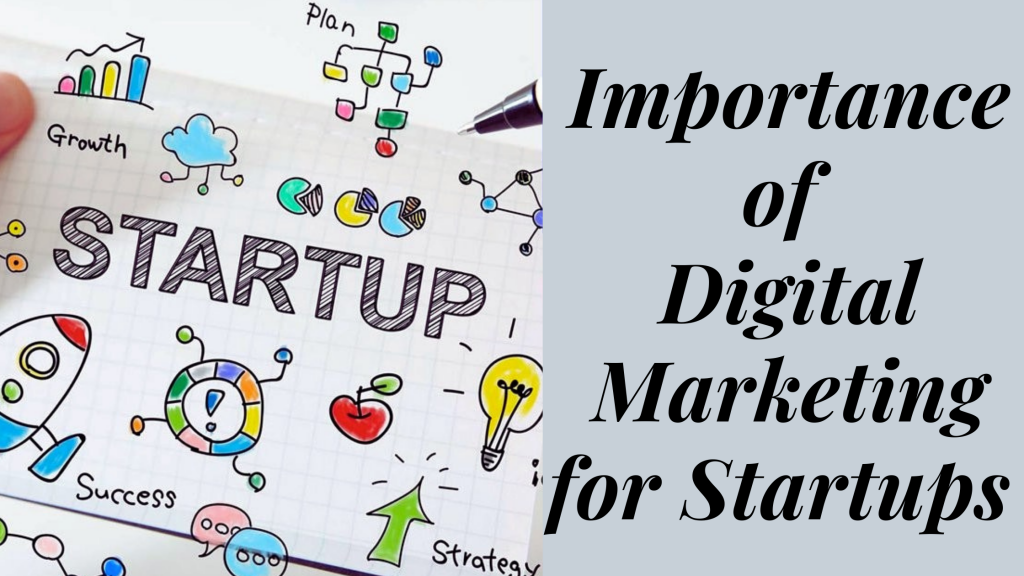
Raising a startup is a big task, so if you don’t have a plan in mind, you might end up wasting your time and money on the wrong things. Let’s talk about the importance of digital marketing for startups in brief. The tactics discussed include all you need to know about succeeding through digital marketing and increasing your company’s online presence.
Though everyone has an opinion, that many experts say traditional marketing is over now and digital marketing still has a long road to go. Once your startup has established itself in the market, it indicates you have to build your customer base that is aware of your goods & services.
Broadly saying, digital marketing assists you in gaining the necessary goodwill among your target audience to ensure your startup is a huge success.
As you can see from the above information, there are a variety of reasons why the importance of digital marketing for startups are vital nowadays. According to CB Insights, 17% of startup businesses fail because they do not advertise themselves properly.
Importance of Digital Marketing for the Success of a Business
Any business in any field can benefit from digital marketing. Irrespective of what your brand sells, digital marketing for business involves developing buyer personas to understand the requirements of your target audience and producing valuable content online. That isn’t true to claim that every company should be using a digital marketing plan in the same way.
The importance of digital marketing in today’s scenario, in particular, can help firms in achieving many goals smoothly:
- Global Reach
- Pocket Friendly
- Measurable ROI
- Improved Targeting
- Relationship Building
B2B Digital Marketing Strategy
If your firm is business-to-business (B2B) your digital marketing for business operations will be most likely based on online generating leads, with the ultimate goal of getting someone to speak with your sales team. As a result, the goal of your marketing plan is to use your website and other digital platforms to generate more and deliver the highest quality leads for your sales team.
You’ll usually opt to put your efforts on business-focused platforms like LinkedIn, where your niche spends time online, in contrast to your website.
B2C Digital Marketing Strategy
If your firm is business-to-consumer (B2C), based on the price point of your goods, the importance of digital marketing for the success of a business will determine by your digital marketing strategy, which is likely to draw traffic to the website and convert them into customers without having to talk with any sales team.
As a result, you’re actually less likely to rely on “leads” in the usual sense and more likely to focus on crafting an accelerated buyer’s journey, from the moment they arrive at your website to the moment they buy the products This means your product features in your content will likely be higher in the marketing funnel than They’re for a B2B company, thus you might need to follow more powerful calls-to-action (CTAs).
Platforms such as Facebook, Instagram, Twitter, Pinterest, and others might be more helpful to B2C businesses than industry-focused platforms such as LinkedIn.
Why Choose Digital Marketing as a Career
Everyone wants to be an expert and successful in their profession, as we all know. There are various fields in which an individual can pursue a career, including IT, Business, Marketing, and Advertising.
In this post, we shall discuss those several valid reasons as to, why choose a career in digital marketing?
1) Digital marketers are in demand across the Globe
In today’s business world, digital marketing is the most popular and in-demand profession. Many companies are eager to hire a digital marketing specialist to help them promote their products and services online. Digital marketing has shown that business growth is simple by using digital strategies – for example, Facebook ads, Twitter, Youtube, LinkedIn, Instagram, or any other social media site, all of which provide an instant reply in comparison to traditional marketing methods.
2) A digital marketing specialist has more opportunities
As the importance of digital marketing for business is recognised by industries the best approach would be to become a professional or specialist. According to the Times of India, digital marketing created 1.5 million jobs in 2017, yet there are now 18 million job openings. Individuals can use digital marketing to demonstrate their talents, abilities, and strategies in order to become core professional marketers. All businesses, whether small, medium or large require skilled digital marketers that can manage and grow their businesses through internet marketing while also increasing their sales.
3) It is Pragmatic
It’s on the verge of a major technological breakthrough. Today market is now equipped with mobile-friendly platforms that can be accessed anywhere, and digital marketing does not follow the traditional strategies. As smartphone users are growing mobile searches have become more common than desktop searches, thus mobile-friendly solutions have been introduced into digital marketing.
4) It’s all about the content
Content creation is the backbone of digital marketing; if your content isn’t engaging, your campaign will fail to generate revenues. Your brand identity is your content. This allows you to monitor if you are winning or losing straight away. As a result, a client’s knowledge about your website is limited to the content that you have published.
5) Make a Search Engine Optimization a Mastery
First and foremost, if you really have the best search engine optimization, you are on fire. You will still be at the top of any organic search results. People today utilise the internet to access information as part of digitalization. In order for your company to get noticed, your investment must be effective.
Future of Digital Marketing in India
In India, the Future of Digital Marketing is still in its early stages. The majority of businesses are still speculating whether or not to use the platform, while many major brands have already launched their digital marketing campaigns. Given India’s vast population (about 460 million young people, of which 333 million are literate) and the growth of a tech-savvy young generation, businesses are more than thrilled to engage with their target audience and promote their goods and services to them via digital platforms. As a result, there will be a significant shift in the near future.
The market valuation of the digital marketing industry is $68 billion, according to eMarketer, advertising on mobile phones and tablets increased by 200 % last year, reaching $6 billion. This market is expected to reach $7.8 billion in the near future. As a result, there is a great need for digital marketing professionals.
While the rest of the economy is trying to grow at a rate of 5 to 10%, digital marketing is flourishing at a rate of 40 %. The most astonishing aspect, however, is that this growth rate will not remain constant in the following years.
Conclusion:
Whether it’s advertising, promotion, or sales, the world of marketing has changed dramatically in recent years. Those who were doubtful of digital marketing’s potential a decade ago have suddenly jumped into the internet’s vast ocean of prospects. Unlike traditional television marketing, which only allowed you to reach your target audiences during prime time, digital marketing allows you to engage with your users nearly at any time, thanks to the internet and smartphones devices. With so many people using smartphones and tablets for everything, it’s clear that the demand for digital marketers will only grow in the future.